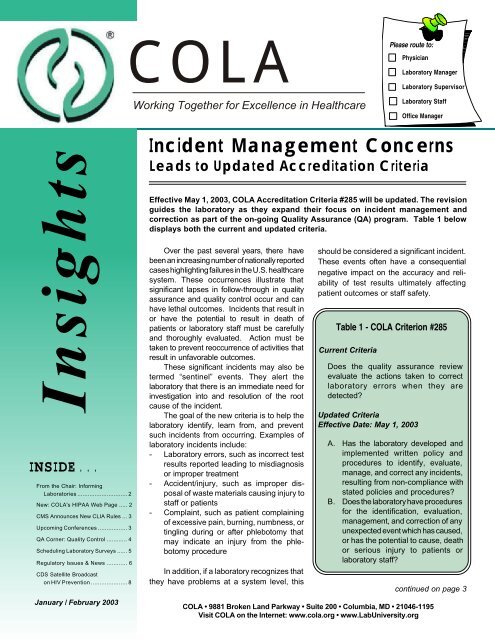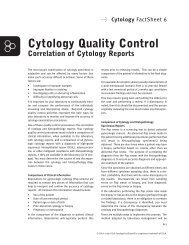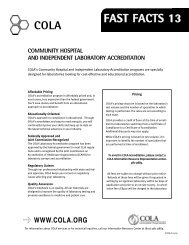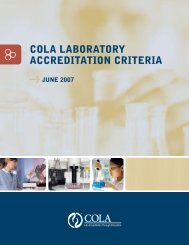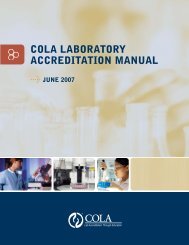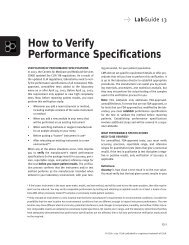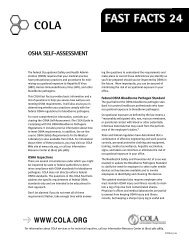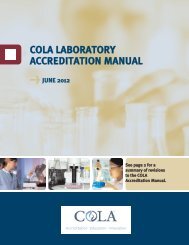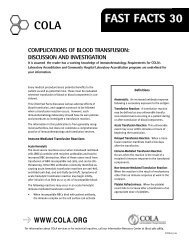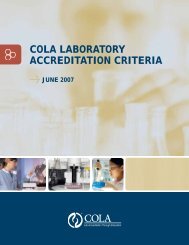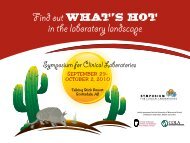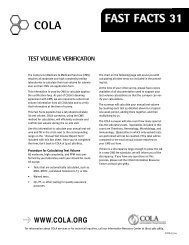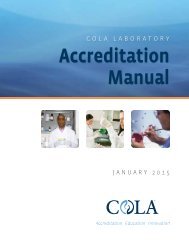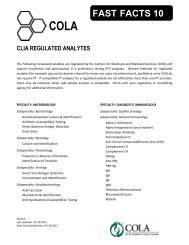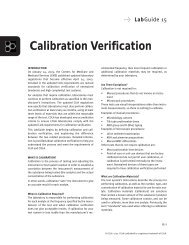Incident Management Concerns Leads To Updated ... - COLA
Incident Management Concerns Leads To Updated ... - COLA
Incident Management Concerns Leads To Updated ... - COLA
You also want an ePaper? Increase the reach of your titles
YUMPU automatically turns print PDFs into web optimized ePapers that Google loves.
CMS Announces New RulesUnder CLIA ‘88We ask all <strong>COLA</strong> Accredited laboratories to continue to follow <strong>COLA</strong>’scurrent criteria. As always, <strong>COLA</strong> will move forward with our educationalapproach as we work with the Centers for Medicare and MedicaidServices (CMS) to determine the changes for <strong>COLA</strong> Accredited laboratoriesunder the new CLIA requirements.<strong>COLA</strong> accredited laboratories will be informed of any and all changes toaccreditation requirements well in advance of their implementation.A more detailed analysis of the Final CLIA regulation will appear in futureissues of Insights and at www.cola.org.<strong>COLA</strong> Co-Sponsors Conference<strong>COLA</strong> is co-sponsoring the Quality Institute Conference 2003:Making the Laboratory a Key Partner in Patient Safety, organizedby the Centers for Disease Prevention and Control (CDC). Themeeting will begin the process of assessing the impact of healthcaresystem changes on laboratory services and patient safety.The program will share perspectives on patient safety fromvarious sectors of healthcare, highlight examples of organizationalactivities that have enhanced patient safety, and provide a forum foridentifying areas for collaboration and initiative development.Conference organizers hope that the conference will initiate theprocess of developing the framework and content for a nationalreport on the quality of laboratory services, developing the criteriafor quality indicators of laboratory services, and developing aprocess for the ongoing collection and analysis of data.The conference will be held April 13-15, 2003, at the J.W. Marriott Hotel Lenox in Atlanta,Georgia. A block of rooms has been reserved for Conference attendees at $112 per night, andreservations will be accepted until March 12, 2003. Registration fees are $250 per person.Space is limited.<strong>To</strong> register on-line or by fax, visit www.phppo.cdc.gov/mlp/qiconference/.Enhanced Laboratory Director Track at CLMA/ASCPIn June 2003, <strong>COLA</strong> will host an enhanced POL Education Track at the CLMA/ASCPAnnual Conference in Salt Lake City, Utah with a focus on Laboratory Director qualifications.In this, the track’s fifth year, we will combine conference style learning with on-line courseworkthat will qualify a physician as a director of a moderate complexity laboratory through theattainment of 20+ CMEs in Lab Director issues.In the past, the “track” has been very well received and this enhancement is an outgrowthof discussions with CLMA on how to further develop and grow the curriculum. The track willcontinue to have offerings for Medical Technologists/CLS, Technicians, and Testing Personnel.Preliminary information about the CLMA/ASCP Annual Meeting is at www.clma.org/pubmain.cfm?section=conference. Please note that <strong>COLA</strong> laboratories qualify for memberrates at the CLMA/ASCP meeting.<strong>COLA</strong> Insights<strong>COLA</strong> is sponsored by the American Academyof Family Physicians (AAFP), the AmericanMedical Association (AMA), the AmericanOsteopathic Association (AOA), the AmericanCollege of Physicians-American Society ofInternal Medicine (ACP-ASIM), and the Collegeof American Pathologists (CAP); and is endorsedby 29 national and state medical organizations.CHAIRHerman I. Abromowitz, MDAmerican Medical Association (AMA)VICE CHAIRMargaret S. Skinner, MDCollege of American Pathologists (CAP)SECRETARYVerlin K. Janzen, MDAmerican Academy of Family Physicians(AAFP)TREASURERIsabel V. Hoverman, MDAmerican College of Physicians - AmericanSociety of Internal Medicine (ACP-ASIM)BOARD OF DIRECTORSAAFPPaul Fischer, MDMary E. Frank, MDAMAVeronica C. Santilli, MD, MHA, CPEJ. Edward Hill, MDACP-ASIMDonna E. Sweet, MDW. James Stackhouse, MD, FACPCAPThomas M. Sodeman, MDHarry J. Zemel, MD, FCAPAOAAmelia G. Tunanidas, DOCHIEF EXECUTIVE OFFICERDouglas A. BeigelEditor in Chief:Verlin K. Janzen, MD<strong>COLA</strong> Board SecretaryManaging Editor:Jennifer L. RiversCorporate CommunicationsSpecialistLetters to the editor are welcome.© <strong>COLA</strong> 2003. <strong>COLA</strong> Insights ispublished bi-monthly by <strong>COLA</strong>,9881 Broken Land Parkway, Suite200, Columbia, MD 21046-1195.This publication may be obtainedthrough enrollment in a <strong>COLA</strong> accreditationprogram, or by subscriptionfor $48 per year. ALLRIGHTS RESERVED. Reproductionin whole or in part withoutwritten permission is prohibited.Information Resource Center:800-981-9883January / February 03Information Resource Center: 800.981.9883 / www.cola.org<strong>COLA</strong> Insights 3
THE QUALITY ASSURANCECORNERQUALITY CONTROL &ACCURATE RESULTSThis is part of a series of articleson quality assurance (QA).Each article will feature a differentQA activity.Quality Control (QC) is essential foryour laboratory to provide accurate testresults. QC is an important element ofthe analytical phase that merits a thoroughQuality Assurance review to evaluatethe entire QC system.Focus on what works in your QCprocess, what doesn’t work, and how thesystem can be improved. You will notsimply re-review your daily QC results,but dig deeper and evaluate QC performanceover time. You may discoverpatterns that need to be investigated.This in-depth analysis is what makesthis effort a QA review rather than justmore QC.Begin by gathering together the materialsyou will need to perform the QAreview for your laboratory.1. QC policies and procedures2. QC materials in use (e.g., packageinserts and assay sheets)3. QC logs and graphs4. Corrective action logsAn easy way to perform your reviewis to ask questions, evaluate what youfind, document the findings, and formulatea plan for any needed improvements.Let’s start with our first question.Are QC policies and procedures beingfollowed as written?This is important to verify. Your policiesand procedures should specifythe frequency and number of controlsto run, acceptable ranges, andwhat to do if ranges are exceeded orshifts or trends appear.If you find that staff is not alwaysfollowing established polices andprocedures, then consider re-writingthose documents to make themclearer and conduct additional trainingfor staff.Are the QC materials in use performingas expected and meeting theneeds of the laboratory?Make sure that you have the mostcurrent package insert and that allcontrols are within expiration dates.Evaluate the stability,cost effectiveness, and shipmentschedules of the productsyou use.Is QC documentation complete,adequately reviewed,and retained forthe proper duration?Check QC logs for legibilityand completeness (includedate with year, lot number,expiration date, expectedranges, initials of testingperson).Confirm that all quantitative resultsare graphed and evaluated for shiftsand trends. Note any out of rangeQC results and confirm that appropriatecorrective actions were takenand documented.Verify that all QC is reviewed by thelaboratory director or designee in atimely manner.Confirm that QC records are retainedfor two years in a manner thatmakes them easily retrievable, anduse this opportunity to discardrecords that are no longer needed.Look for ways to streamline or simplifyrecord keeping without sacrificingcompliance.Are corrective actions effective orare QC problems recurring?Review corrective action logs to confirmthat corrective actions wereprompt, consistent, and effective sothat no patient results were compromised.Look for repeat corrective actions forsimilar QC problems and for patterns.Recurrent QC problems canindicate instability of the QC material,inadequate training, or the needfor instrument maintenance.Analyze your answers to each question.Strive for continuous improvementin your QC process even if your findingsare satisfactory. If problems are found,then try to uncover the root cause.Formulate a corrective action planthat is open to solving problems in newways. Implement any needed correctiveactions and schedule a follow-up reviewto assess the effectiveness of thosecorrective actions.Document each step of the QA processand share the results with all laboratorystaff, encouraging discussion.Depending on the size of your laboratory,a thorough QA review of QC canseem overwhelming. Consider performingmonthly or quarterly reviews thataddress different QC topics, dividing theQA review into more manageable pieces.Alternately, select particular testsor instruments for review. Always beprepared to conduct an unscheduledreview if a QC problem arises that needsimmediate attention.4 <strong>COLA</strong> InsightsInformation Resource Center: 800.981.9883 / www.cola.org January / February 03
...Scheduling <strong>COLA</strong>Laboratory Surveys<strong>COLA</strong>’s customer service staff frequently receives inquiriesregarding the scheduling process for laboratory surveys.These include questions about the factors that come into playregarding timing, choice of laboratories, availability of surveyors,and flexibility for changes to scheduled surveys. Thefollowing information will answer some of the most frequentlyasked questions regarding scheduling surveys.Selection ProcessFederal requirements state that clinical laboratories mustbe inspected on a 24-month cycle (plus or minus two months).This lag time allows <strong>COLA</strong> the flexibility to schedule laboratoriesin the most efficient manner. Accreditation and fees aretracked on independent two-year cycles, so moving the surveydate up or back does not effect the fees.The selection process is based on geographic regions.The scheduler tries to organize all laboratories requiring asurvey in a specific area into the same survey cycle (two-weekperiod) to minimize the need for a surveyor to repeatedly travelback to that particular area. This helps keep costs down for<strong>COLA</strong>, and in turn keep costs down for our laboratories.The Scheduling NoticeLaboratories selected for a survey receive an initial notificationletter 8 to 10 weeks prior to the survey date. This first lettergives the client the necessary information to prepare for thesurvey, and the time frame that the surveyor will be in the area.The laboratory has the opportunity to provide its days and hoursof operation as input into the scheduling process.Unfortunately, it is not possible to accommodate all requestsfor a specific date and time, as travel time to and fromthe laboratory, size of the facility, competing requests fromother laboratories, and number of laboratories to be surveyed allhave to be factored in to scheduling. The surveyor considerseach laboratory request and makes every effort to accommodatethese requests if possible.The final letter provides the exact date, time, and name of thesurveyor; it is usually mailed 4-6 weeks before the date of thesurvey. On rare occasions, laboratories may be contacted onshort notice to fill a vacancy in the survey schedule caused bythe cancellation of another scheduled laboratory. Occasionally,travel problems or surveyor illness cause <strong>COLA</strong> to have tocancel a laboratory survey and reschedule.Rescheduling Survey Process<strong>COLA</strong> minimizes scheduling changes to maintain the mostcost-effective schedule for both <strong>COLA</strong> and our clients. It is notnecessary for the Laboratory Director to be on site for thesurvey; thus, when the Laboratory Director is unable to bethere, it is not considered a valid reason to cancel/postpone thesurvey. Many times our surveyors have an exit interview withthe Laboratory Director by telephone after completing thesurvey. Laboratory records can be arranged for surveyors inadvance. It is also best to have a contact person present whois familiar with patient testing and the laboratory processes andis available to answer surveyor questions.If the laboratory cannot accommodate the scheduled survey,then <strong>COLA</strong> should be notified by phone as soon aspossible with the reasons for requesting the cancellation. Thisinitial phone notification should then be followed up in writing,documenting the reasons for requesting a cancellation of thesurvey. A laboratory is allowed one cancellation of a survey forserious cause, such as the illness or death of key people, orstructural damage to the facility.A laboratory that cancels a previously scheduled surveywithout sufficient cause will be charged a rescheduling fee of$200. The rescheduled survey will not occur before therescheduling fee is paid. Failure to pay the fee is grounds fordenial of accreditation. If a laboratory cancels a second time,the laboratory can be subject to an unannounced survey.Failure to agree to the unannounced survey, or refusal to allowsurveyor access, are also grounds for denial of accreditation.This article provides the information necessary to help<strong>COLA</strong> participants better understand the survey schedulingprocess. If you have questions, then please contact <strong>COLA</strong> at800-981-9883 for more information.<strong>COLA</strong> Educational Resourcesfor LaboratoriesVisit <strong>COLA</strong>'s On-line Bookstore atwww.cola.orgJanuary / February 03Information Resource Center: 800.981.9883 / www.cola.org<strong>COLA</strong> Insights 5
NEW INFORMATION ON:Genetics Waived TestingHIPAA Physician PaymentsREGULATORY ISSUES &NEWS UPDATEGenetics PanelIn December 2002, Department ofHealth and Human Services (HHS) Secretary<strong>To</strong>mmy G. Thompson named 13doctors, scientists, and other experts tothe Secretary’s Advisory Committee onGenetics, Health, and Society. Thecommittee is the successor to theSecretary’s Advisory Committee on GeneticTesting (SACGT), which was notre-chartered in late 2002.The new committee will be chairedby Edward McCabe, M.D., Ph.D., who isthe executive chair of the pediatricsdepartment at the University of California-LosAngeles and physician-in-chiefat UCLA’s Mattel Children’s Hospital.The committee’s new charge is an expansionof the mission of the SACGT tomore broadly consider the impact ofgenetic technologies on society.At the department’s request, thecommittee may consider the broad rangeof human health and societal issuesinvolving the development, use, and potentialmisuse of genetic technologiesand make recommendations as appropriate.The committee’s charge includesconsidering the clinical, ethical, legal,and societal implications of genetic testingand other technologies. Its membersinclude experts in each of those areas,as well as consumer representatives.As a corollary, the Centers for DiseaseControl and Prevention (CDC) iscurrently drafting regulations to includeGenetic testing as a specialty underCLIA regulations.Waived Testing DeathThere continues to be a great deal ofconcern in government circles over theproper performance of waived tests. Aswe have noted previously, CMS initiatedon-site surveys of 2% of waived facilitieseach year.Recently, CMS identified and verifiedat least one patient death at anursing home that is attributable to incorrectlyperformed glucose testing, includinga lack of or improper training andlack of proper quality control.As the government’s examination ofwaived testing problems continues, <strong>COLA</strong>is working with the laboratory industry todevelop voluntary training programs andmechanisms to improve compliance withwaived test system operating instructions.More information on the <strong>COLA</strong>waived testing program is forthcoming.HIPAA Final Privacy RuleOn August 14, 2002, the HHS issuedthe final modifications to the Standardsfor Privacy of Individually IdentifiableHealth Information (“Privacy Rule”)under the Health Insurance Portabilityand Accountability Act (HIPAA) of 1996.The final rule clarified and adoptedmany of the proposed modifications presentedpublicly in March 2002, but didnot postpone the April 14, 2003, deadlinefor compliance (April 14, 2004, forsmall health plans).On December 4, 2002, HHS issueda 123-page guidance document thatexplains and answers questions aboutkey elements of the requirements of thePrivacy Rule. The guidance is meant tocommunicate the privacy policies containedin the Privacy Rule as clearly aspossible. For each particular segment inthe Privacy Rule, the guidance providesa brief explanation of the segment andhow the Rule works, followed by “FrequentlyAsked Questions” about thatprovision.The guidance does not address all ofthe relevant provisions in the Rule, althoughHHS anticipates adding segmentsin the future as it develops guidanceon more Privacy Rule standards.The new guidance can be found onthe Internet at www.hhs.gov/ocr/hipaa/privacy.html.White House, Congress, and CMS Announce Changes to Physician PaymentsOn February 20, President Bush signed the budget bill containing the Medicare payment fix that will add $54 billion to physicianpayments over the next ten years. On February 13, Congress passed the budget bill (H. J. Res. 2) which includes languageauthorizing HHS to correct the 1998 and 1999 Medicare projection errors.At a recent House Ways and Means hearing, the Centers for Medicare and Medicaid Services (CMS) Administrator ThomasScully indicated that the resulting congressional action allows for a 1.6 percent (versus a 4.4 percent cut announced on December31, 2002) increase in Medicare payments effective March 1.BackgroundIn the December 31, 2002, Federal Register, CMS published the final rule (with comment period) to update physician paymentrates under the Medicare 2003 Physician Fee Schedule.A flawed update formula in the 2002 Physician Fee Schedule reduced payments to all physicians, including pathologists,by –5.4% as of January 1, 2002. CMS was not permitted by law to administratively correct the flaw in the formula and thereforeannounced a physician fee schedule update of –4.4% for 2003, the second year in a row for cuts in reimbursement. The enactmentof H.J. Res. 2 allows the department to correct the flaw.Other policy changes in the CMS rule concern Medicare qualifications for clinical nurse specialists and an update to the codessubject to physician self-referral prohibitions. Comments are being accepted on these and other issues listed in the final rule untilMarch 3, 2003.6 <strong>COLA</strong> InsightsInformation Resource Center: 800.981.9883 / www.cola.org January / February 03
PAID ADVERTISEMENT
CDC Satellite Broadcaston HIV Prevention“Update on Rapid Testing forHIV,” a satellite broadcast and webcast, is scheduled for Thursday,April 24, 2003, at 1 p.m. EST. The 2-hour forum is cosponsored by theCenters for Disease Control andPrevention (CDC) and the PublicHealth Training Network.It will describe rapid tests for HIVincluding availability, administration,benefits and limitations; implementationconsiderations for counselingand testing; confirmatory testing forpositive test results; quality assuranceand training; and resources forupdates on rapid testing.The broadcast will feature presentations,interviews, and panel responseto audience questions. Thisbroadcast is designed for health departments,community and nationalorganizations including AIDS organizations,and public and privatelaboratories that administer rapidtesting for HIV.Viewers can fax questions andcomments before, during, and afterthe broadcast. Additional informationis available on the CDC WebSite at www.cdcnpin.org/broadcastand through CDC’s Fax InformationSystem at telephone (888) 232-3299, by entering document number130039 and a return fax number.Organizations are responsiblefor setting up their own viewing sitesand are encouraged to register theirsite as early as possible so thatviewers can access informationabout viewing locations on-line atthe web site. Health departmentsand other organizations are stronglyencouraged to invite community partnersworking in HIV/AIDS preventionto view this broadcast.This broadcast may also beviewed live or later on computerswith Internet and Real Player capabilitiesthrough a web link atwww.phppo.cdc.gov/phtn. Videotapesof the broadcast may be ordered,while supplies last, by calling800-458-5231.9881 Broken Land Parkway/ Suite 200Columbia, MD 21046-1195www.cola.orgTHIS IS A PAID SUBSCRIPTIONNON PROFIT ORG.U.S. POSTAGEPAIDPERMIT #472LANCASTER, PA<strong>COLA</strong> Insights NewsletterFirst Place Award Recipient2002 PRSA Best In Maryland Awards


